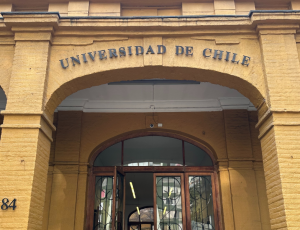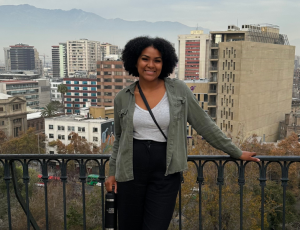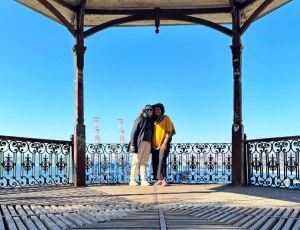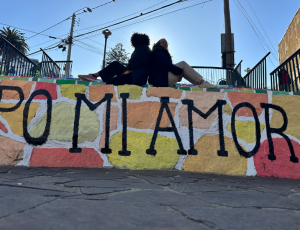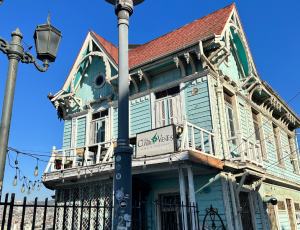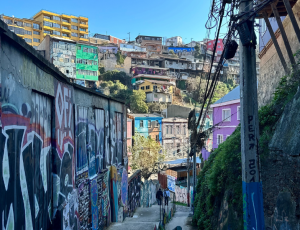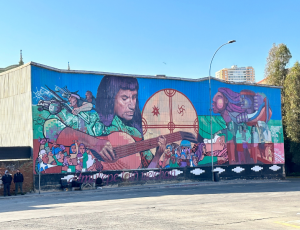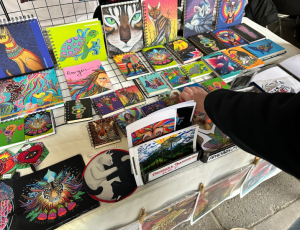by Nathaniel Whelan
In June 2023, two Carleton undergraduate students travelled to Santiago for a two-week internship with the Faculty of Architecture and Urbanism at the University of Chile.
This experience was made possible thanks to funding from Global Skills Opportunity (GSO), a pilot program designed to address financial concerns and other barriers preventing participation in international mobility. As a member of CALAREO, a consortium of 5 Canadian universities, one of our strategic goals is to support student visits between Carleton and institutions in Latin America, and so, when GSO funding came through in 2021, part of those funds went to help Aiyana Louis and Mikayla Lochbihler embark on this trip to Chile.
Aiyana is a student in the Environmental Studies program with a minor in Biology, while Mikayla is in Geography with a concentration in Urban Studies and a minor in Community Engagement. Both are in their final year at Carleton.
Speaking about the GSO grant, Aiyana said:
“It was critical. Had there been no funding, I don’t think I would have been able to participate in this internship given my financial circumstances.”
Aiyana and Mikayla initially heard about this opportunity through one of their professors, Dr. Karen Hébert. After some encouragement, Hébert connected them with Dr. Beatriz Bustos, one of her professional contacts at the University of Chile, who agreed to host Aiyana and Makayla throughout the duration of the internship.
The Faculty of Architecture and Urbanism is currently engaged in several projects in the field of Urban Geography. One initiative is aimed at furthering public acceptance of photovoltaic energy in place of fossil fuel use on agriculture farms in Marchigüe (a few hours south of Santiago). Due to water scarcity and access issues, many Chilean farmers are no longer able to irrigate their crops. In an attempt to recuperate loss of revenue, many of these farmers have converted or rented out their land to serve as solar farms.
During their internship, Aiyana and Mikayla supported Dr. Bustos’s research by summarizing English literature on photovoltaic energy and preparing material to be distributed to residents of Marchigüe, after being translated into Spanish. This project allowed them to gain valuable experience in a professional research environment, learn more about renewable energy, and advocate for sustainability.
Even though they were working 5 days a week, Aiyana and Mikayla still found time to explore the city, visit museums, and try new foods – they even managed to sneak in a weekend trip to the beautiful coastal city of Valparaiso – but it all served to develop a broader global perspective.
When asked to elaborate, Aiyana said:
“Just by observing the infrastructure, artwork, and everyday people on our way to and from the university, we could see the differences and similarities between Santiago and some Canadian cities, as well as how history is woven into every corner of Chilean society.”
One of Dr. Bustos’s students played a key role in helping expand their worldview. She was generous with her time and willing to share a lot of background information on the project, her experience growing up in Chile, cultural customs, and current political issues. Even now, they share a music playlist with over 10 hours of songs.
Aiyana and Mikayla are in a unique position because they also participated in the Cuba field school last May. Through site visits, in-class learning, and self-directed research, its purpose was to develop a deeper understanding of the Cuban Revolution through the prism of one contemporary urban system, Havana.
Going on back-to-back trips provided them with an expanded view of Latin America and the Caribbean. It was a chance to witness Cuba and Chile’s authenticity first-hand and challenge pre-conceived notions about the region as a whole.
Reflecting on these two experiences, Mikayla said:
“The assumption that these countries are very similar is a common misconception. Their cultures, climates, music, food, and socio-political atmospheres are drastically different. In my opinion, the Spanish language is really the only similarity, and even then, the speed and pronunciation of speech are almost nothing alike. I was intrigued to learn more about these differences and challenge my assumptions of each place.”
Having recently returned home, Aiyana also spoke to how international travel is a chance to understand how to behave as a guest in other countries. In addition, there are a number safety precautions to consider. Learning how to interact with others, being mindful of your actions, and taking note of your surroundings is all part of the experience. What might be perceived as “common sense” in Canada, might not be the case elsewhere.
Aiyana, who wants to build a career with some level of travel, found this to be a great learning experience. She said:
“Travelling requires good safety protocols, organization, confidence, and finding comfortability in the uncomfortable, and that is exactly what I learned. I have a deeper sense of self after overcoming some of the mental and physical challenges of travelling internationally.”
In more ways than one, the GSO internship had a profound impact on Aiyana and Mikayla, who are both eager to follow-up their trip with a third international experience. Aiyana is planning on completing her final semester abroad in Australia, whereas Mikayla is hoping to travel to London next with her partner.
To learn more about the different mobility opportunities offered to Carleton students, please visit our international research mobility webpage.
